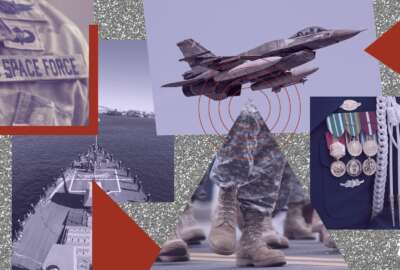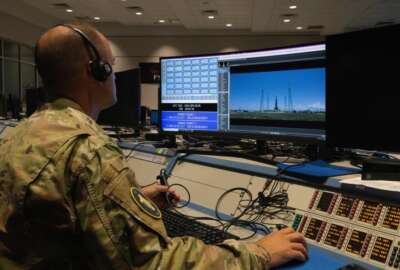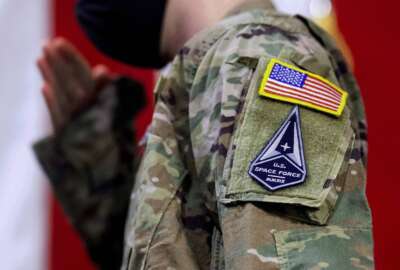ROTC-like pilot program builds Space Force civilian talent pipeline
The pilot program allows college students to get experience working with the Space Force. College students are then guaranteed a civilian job upon graduation.
The Space Force, in partnership with the Office of the Secretary of Defense, is piloting a program similar to the Reserve Officer Training Corps but for civilian careers.
The program, now in its second year, allows college students at participating universities, including North Carolina Agricultural and Technical State University, Purdue University, the University of Arizona, and Virginia Polytechnic Institute and State University, to get firsthand experience working with the Space Force and learn what it means to be a civilian employee in the newest military branch.
Unlike the Reserve Officer Training Corps program, which trains college students to become commissioned officers, the pilot program guarantees students a civilian job at the Space Force upon graduation.
“We’ve had great success so far. [College students] can volunteer to come and work with the Space Force. When they do that, they get an exposure to what’s a civilian job in the Space Force, and what does it mean to be a civilian employee or a federal employee in the Space Force,” Deputy Chief of Space Operations for Human Capital Katharine Kelley said last week.
“There’s still a lot of data out there that shows that a lot of the United States doesn’t understand that you can be in the military but be a civilian and be supported and be supporting. This exposes that talent population in some of these schools to those opportunities. Then they go back, they do their normal school year, and we guarantee them a job when they graduate.”
The fiscal 2020 defense policy bill mandated the Defense Department to set up the Defense Civilian Training Corps. Congress has authorized a five-year runway for the initiative, allowing the Space Force and the broader DoD to assess its effectiveness in developing a civilian talent pipeline.
“We’re experimenting with how that model could work on the civilian side. We’ll be able to see how this works out and how many people actually take the job offer, and then how it goes,” said Kelley.
Developing civilian pipeline
As the service works to establish its identity and culture, it developed a document in the past year detailing roles and expectations for its officers, enlisted personnel, and civilians.
Civilians make up nearly 50% of the Space Force workforce, so the document lays out “where we go as a service” in terms of the role the civilian personnel has in the ecosystem, said Kelley.
“The civilian ecosystem for the Space Force is unbelievably powerful. They are doing functions that are actually directly supporting our space disciplines, as well as the more traditional support functions that you might expect for any service,” said Kelley.
“One of the things that we’re working on is tailoring training for them that allows them to continue that technical expertise that they bring based on the job series and the experience base that they have, but also create a better exposure and awareness to how the Space Force is actually going to support the joint fight.”
The training is designed to bridge that gap and help civilians better understand how their work fits into the organization’s ecosystem and contributes to the overall mission.
“What we found is that there’s a lot of people, both nationally, in our country and even in our own service, who are still trying to figure out exactly what the Space Force is bringing to the fight. I think we found that that is not just external awareness challenges. We’ve got to actually educate our own force,” said Kelley.
“We’re very excited about where that goes, and we just kicked off what we’re right now calling an exposure to the Space Force mission for our civilians. This domain has changed, and we need to give everybody an awareness of what is at stake and what the real space environment looks like today. We’re intentionally focusing that on the civilian side as well.”
The effort goes hand in hand with the service’s first-ever Officer Training Course, which is changing how the Space Force trains its next generation of officers.
All officers entering the force are now required to attend a 12-month training course that teaches them to be “Guardians first and specialists second.”
Copyright © 2024 Federal News Network. All rights reserved. This website is not intended for users located within the European Economic Area.







